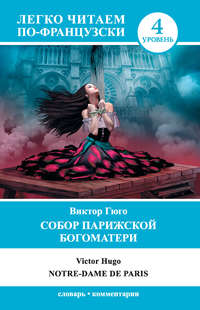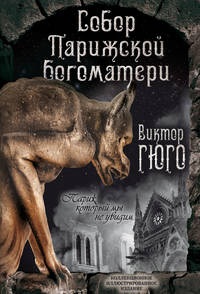
Полная версия
The Hunchback of Notre-Dame
A shout of laughter from all the students greeted the unlucky name of the poor furrier of the king’s robes.
“Lecornu! Gilles Lecornu!” said some.
“Cornutus et hirsutus, horned and hairy,” another went on.
“He! of course,” continued the small imp on the capital, “What are they laughing at? An honorable man is Gilles Lecornu, brother of Master Jehan Lecornu, provost of the king’s house, son of Master Mahiet Lecornu, first porter of the Bois de Vincennes, all bourgeois of Paris, all married, from father to son.”
The gayety redoubled. The big furrier, without uttering a word in reply, tried to escape all the eyes riveted upon him from all sides; but he perspired and panted in vain; like a wedge entering the wood, his efforts served only to bury still more deeply in the shoulders of his neighbors, his large, apoplectic face, purple with spite and rage.
At length one of these, as fat, short, and venerable as himself, came to his rescue.
“Abomination! scholars addressing a bourgeois in that fashion in my day would have been flogged with a fagot, which would have afterwards been used to burn them.”
The whole band burst into laughter.
“Holà hé! who is scolding so? Who is that screech owl of evil fortune?”
“Hold, I know him” said one of them; “’tis Master Andry Musnier.”
“Because he is one of the four sworn booksellers of the university!” said the other.
“Everything goes by fours in that shop,” cried a third; “the four nations, the four faculties, the four feasts, the four procurators, the four electors, the four booksellers.”
“Well,” began Jean Frollo once more, “we must play the devil with them.”*
“Musnier, we’ll burn your books.”
“Musnier, we’ll beat your lackeys.”
“Musnier, we’ll kiss your wife.”
“That fine, big Mademoiselle Oudarde.”
“Who is as fresh and as gay as though she were a widow.”
“Devil take you!” growled Master Andry Musnier.
“Master Andry,” pursued Jean Jehan, still clinging to his capital, “hold your tongue, or I’ll drop on your head!”
Master Andry raised his eyes, seemed to measure in an instant the height of the pillar, the weight of the scamp, mentally multiplied that weight by the square of the velocity and remained silent.
Jehan, master of the field of battle, pursued triumphantly:
“That’s what I’ll do, even if I am the brother of an archdeacon!”
“Fine gentry are our people of the university, not to have caused our privileges to be respected on such a day as this! However, there is a maypole and a bonfire in the town; a mystery, Pope of the Fools, and Flemish ambassadors in the city; and, at the university, nothing!”
“Nevertheless, the Place Maubert is sufficiently large!” interposed one of the clerks established on the window-sill.
“Down with the rector, the electors, and the procurators!” cried Joannes.
“We must have a bonfire this evening in the Champ-Gaillard,” went on the other, “made of Master Andry’s books.”
“And the desks of the scribes!” added his neighbor.
“And the beadles’ wands!”
“And the spittoons of the deans!”
“And the cupboards of the procurators!”
“And the hutches of the electors!”
“And the stools of the rector!”
“Down with them!” put in little Jehan, as counterpoint; “down with Master Andry, the beadles and the scribes; the theologians, the doctors and the decretists; the procurators, the electors and the rector!”
“The end of the world has come!,” muttered Master Andry, stopping up his ears.
“By the way, there’s the rector! see, he is passing through the Place,” cried one of those in the window.
Each rivalled his neighbor in his haste to turn towards the Place.
“Is it really our venerable rector, Master Thibaut?” demanded Jehan Frollo du Moulin, who, as he was clinging to one of the inner pillars, could not see what was going on outside.
“Yes, yes,” replied all the others, “it is really he, Master Thibaut, the rector.”
It was, in fact, the rector and all the dignitaries of the university, who were marching in procession in front of the embassy, and at that moment traversing the Place. The students crowded into the window, saluted them as they passed with sarcasms and ironical applause. The rector, who was walking at the head of his company, had to support the first broadside; it was severe.
“Good day, monsieur le recteur! Holà hé! good day there!”
“How does he manage to be here, the old gambler? Has he abandoned his dice?”
“How he trots along on his mule! her ears are not so long as his!”
“Holà hé! good day, monsieur le recteur Thibaut! Tybalde aleator! Old fool! old gambler!”
“God preserve you! Did you throw double six often last night?”
“Oh! what a decrepit face, livid and haggard and drawn with the love of gambling and of dice!”
“Where are you bound for in that fashion, Thibaut, Tybalde ad dados, with your back turned to the university, and trotting towards the town?”
“He is on his way, no doubt, to seek a lodging in the Rue Thibautodé?”* cried Jehan du M. Moulin.
The entire band repeated this quip in a voice of thunder, clapping their hands furiously.
“You are going to seek a lodging in the Rue Thibautodé, are you not, monsieur le recteur, gamester on the side of the devil?”
Then came the turns of the other dignitaries.
“Down with the beadles! down with the mace-bearers!”
“Tell me, Robin Pouissepain, who is that yonder?”
“He is Gilbert de Suilly, Gilbertus de Soliaco, the chancellor of the College of Autun.”
“Hold on, here’s my shoe; you are better placed than I, fling it in his face.”
“Saturnalitias mittimus ecce nuces.”
“Down with the six theologians, with their white surplices!”
“Are those the theologians? I thought they were the white geese given by Sainte-Geneviève to the city, for the fief of Roogny.”
“Down with the doctors!”
“Down with the cardinal disputations, and quibblers!”
“My cap to you, Chancellor of Sainte-Geneviève! You have done me a wrong. ’Tis true; he gave my place in the nation of Normandy to little Ascanio Falzapada, who comes from the province of Bourges, since he is an Italian.”
“That is an injustice,” said all the scholars. “Down with the Chancellor of Sainte-Geneviève!”
“Ho hé! Master Joachim de Ladehors! Ho hé! Louis Dahuille! Ho he Lambert Hoctement!”
“May the devil stifle the procurator of the German nation!”
“And the chaplains of the Sainte-Chapelle, with their gray amices; cum tunices grisis!”
“Seu de pellibus grisis fourratis!”
“Holà hé! Masters of Arts! All the beautiful black copes! all the fine red copes!”
“They make a fine tail for the rector.”
“One would say that he was a Doge of Venice on his way to his bridal with the sea.”
“Say, Jehan! here are the canons of Sainte-Geneviève!”
“To the deuce with the whole set of canons!”
“Abbé Claude Choart! Doctor Claude Choart! Are you in search of Marie la Giffarde?”
“She is in the Rue de Glatigny.”
“She is making the bed of the king of the debauchees. She is paying her four deniers* quatuor denarios.”
“Aut unum bombum.”
“Would you like to have her pay you in the face?”
“Comrades! Master Simon Sanguin, the Elector of Picardy, with his wife on the crupper!”
“Post equitem seclet atra eura—behind the horseman sits black care.”
“Courage, Master Simon!”
“Good day, Mister Elector!”
“Good night, Madame Electress!”
“How happy they are to see all that!” sighed Joannes de Molendino, still perched in the foliage of his capital.
Meanwhile, the sworn bookseller of the university, Master Andry Musnier, was inclining his ear to the furrier of the king’s robes, Master Gilles Lecornu.
“I tell you, sir, that the end of the world has come. No one has ever beheld such outbreaks among the students! It is the accursed inventions of this century that are ruining everything—artilleries, bombards, and, above all, printing, that other German pest. No more manuscripts, no more books! printing will kill bookselling. It is the end of the world that is drawing nigh.”
“I see that plainly, from the progress of velvet stuffs,” said the fur-merchant.
At this moment, midday sounded.
“Ha!” exclaimed the entire crowd, in one voice.
The scholars held their peace. Then a great hurly-burly ensued; a vast movement of feet, hands, and heads; a general outbreak of coughs and handkerchiefs; each one arranged himself, assumed his post, raised himself up, and grouped himself. Then came a great silence; all necks remained outstretched, all mouths remained open, all glances were directed towards the marble table. Nothing made its appearance there. The bailiff’s four sergeants were still there, stiff, motionless, as painted statues. All eyes turned to the estrade reserved for the Flemish envoys. The door remained closed, the platform empty. This crowd had been waiting since daybreak for three things: noonday, the embassy from Flanders, the mystery play. Noonday alone had arrived on time.
On this occasion, it was too much.
They waited one, two, three, five minutes, a quarter of an hour; nothing came. The dais remained empty, the theatre dumb. In the meantime, wrath had succeeded to impatience. Irritated words circulated in a low tone, still, it is true. “The mystery! the mystery!” they murmured, in hollow voices. Heads began to ferment. A tempest, which was only rumbling in the distance as yet, was floating on the surface of this crowd. It was Jehan du Moulin who struck the first spark from it.
“The mystery, and to the devil with the Flemings!” he exclaimed at the full force of his lungs, twining like a serpent around his pillar.
The crowd clapped their hands.
“The mystery!” it repeated, “and may all the devils take Flanders!”
“We must have the mystery instantly,” resumed the student; “or else, my advice is that we should hang the bailiff of the courts, by way of a morality and a comedy.”
“Well said,” cried the people, “and let us begin the hanging with his sergeants.”
A grand acclamation followed. The four poor fellows began to turn pale, and to exchange glances. The crowd hurled itself towards them, and they already beheld the frail wooden railing, which separated them from it, giving way and bending before the pressure of the throng.
It was a critical moment.
“To the sack, to the sack!” rose the cry on all sides.
At that moment, the tapestry of the dressing-room, which we have described above, was raised, and afforded passage to a personage, the mere sight of whom suddenly stopped the crowd, and changed its wrath into curiosity as by enchantment.
“Silence! silence!”
The personage, but little reassured, and trembling in every limb, advanced to the edge of the marble table with a vast amount of bows, which, in proportion as he drew nearer, more and more resembled genuflections.
In the meanwhile, tranquillity had gradually been restored. All that remained was that slight murmur which always rises above the silence of a crowd.
“Messieurs the bourgeois,” said he, “and mesdemoiselles the bourgeoises, we shall have the honor of declaiming and representing, before his eminence, monsieur the cardinal, a very beautiful morality which has for its title, ‘The Good Judgment of Madame the Virgin Mary.’ I am to play Jupiter. His eminence is, at this moment, escorting the very honorable embassy of the Duke of Austria; which is detained, at present, listening to the harangue of monsieur the rector of the university, at the gate Baudets. As soon as his illustrious eminence, the cardinal, arrives, we will begin.”
It is certain, that nothing less than the intervention of Jupiter was required to save the four unfortunate sergeants of the bailiff of the courts. If we had the happiness of having invented this very veracious tale, and of being, in consequence, responsible for it before our Lady Criticism, it is not against us that the classic precept, Nec deus intersit, could be invoked. Moreover, the costume of Seigneur Jupiter, was very handsome, and contributed not a little towards calming the crowd, by attracting all its attention. Jupiter was clad in a coat of mail, covered with black velvet, with gilt nails; and had it not been for the rouge, and the huge red beard, each of which covered one-half of his face—had it not been for the roll of gilded cardboard, spangled, and all bristling with strips of tinsel, which he held in his hand, and in which the eyes of the initiated easily recognized thunderbolts—had not his feet been flesh-colored, and banded with ribbons in Greek fashion, he might have borne comparison, so far as the severity of his mien was concerned, with a Breton archer from the guard of Monsieur de Berry.
* The word Gothic, in the sense in which it is generally employed, is wholly unsuitable, but wholly consecrated. Hence we accept it and we adopt it, like all the rest of the world, to characterize the architecture of the second half of the Middle Ages, where the ogive is the principle which succeeds the architecture of the first period, of which the semi-circle is the father.
* Faire le diable a quatre.
* Thibaut au des,—Thibaut of the dice.
* An old French coin, equal to the two hundred and fortieth part of a pound.
CHAPTER 2
Pierre Gringoire
Nevertheless, as he harangued them, the satisfaction and admiration unanimously excited by his costume were dissipated by his words; and when he reached that untoward conclusion: “As soon as his illustrious eminence, the cardinal, arrives, we will begin,” his voice was drowned in a thunder of hooting.
“Begin instantly! The mystery! the mystery immediately!” shrieked the people. And above all the voices, that of Johannes de Molendino was audible, piercing the uproar like the fife’s derisive serenade: “Commence instantly!” yelped the scholar.
“Down with Jupiter and the Cardinal de Bourbon!” vociferated Robin Poussepain and the other clerks perched in the window.
“The morality this very instant!” repeated the crowd; “this very instant! the sack and the rope for the comedians, and the cardinal!”
Poor Jupiter, haggard, frightened, pale beneath his rouge, dropped his thunderbolt, took his cap in his hand; then he bowed and trembled and stammered: “His eminence—the ambassadors—Madame Marguerite of Flanders—.” He did not know what to say. In truth, he was afraid of being hung.
Hung by the populace for waiting, hung by the cardinal for not having waited, he saw between the two dilemmas only an abyss; that is to say, a gallows.
Luckily, someone came to rescue him from his embarrassment, and assume the responsibility.
An individual who was standing beyond the railing, in the free space around the marble table, and whom no one had yet caught sight of, since his long, thin body was completely sheltered from every visual ray by the diameter of the pillar against which he was leaning; this individual, we say, tall, gaunt, pallid, blond, still young, although already wrinkled about the brow and cheeks, with brilliant eyes and a smiling mouth, clad in garments of black serge, worn and shining with age, approached the marble table, and made a sign to the poor sufferer. But the other was so confused that he did not see him. The newcomer advanced another step.
“Jupiter,” said he, “my dear Jupiter!”
The other did not hear.
At last, the tall blond, driven out of patience, shrieked almost in his face,
“Michel Giborne!”
“Who calls me?” said Jupiter, as though awakened with a start.
“I,” replied the person clad in black.
“Ah!” said Jupiter.
“Begin at once,” went on the other. “Satisfy the populace; I undertake to appease the bailiff, who will appease monsieur the cardinal.”
Jupiter breathed once more.
“Messeigneurs the bourgeois,” he cried, at the top of his lungs to the crowd, which continued to hoot him, “we are going to begin at once.”
“Evoe Jupiter! Plaudite cives! All hail, Jupiter! Applaud, citizens!” shouted the scholars.
“Noel! Noel! good, good,” shouted the people.
The hand-clapping was deafening, and Jupiter had already withdrawn under his tapestry, while the hall still trembled with acclamations.
In the meanwhile, the personage who had so magically turned the tempest into dead calm, as our old and dear Corneille puts it, had modestly retreated to the half-shadow of his pillar, and would, no doubt, have remained invisible there, motionless, and mute as before, had he not been plucked by the sleeve by two young women, who, standing in the front row of the spectators, had noticed his colloquy with Michel Giborne-Jupiter.
“Master,” said one of them, making him a sign to approach. “Hold your tongue, my dear Liénarde,” said her neighbor, pretty, fresh, and very brave, in consequence of being dressed up in her best attire. “He is not a clerk, he is a layman; you must not say master to him, but messire.”
“Messire,” said Liénarde.
The stranger approached the railing.
“What would you have of me, damsels?” he asked, with alacrity.
“Oh! nothing,” replied Liénarde, in great confusion; “it is my neighbor, Gisquette la Gencienne, who wishes to speak with you.”
“Not so,” replied Gisquette, blushing; “it was Liénarde who called you master; I only told her to say messire.”
The two young girls dropped their eyes. The man, who asked nothing better than to enter into conversation, looked at them with a smile.
“So you have nothing to say to me, damsels?”
“Oh! nothing at all,” replied Gisquette.
“Nothing,” said Liénarde.
The tall, light-haired young man retreated a step; but the two curious maidens had no mind to let slip their prize.
“Messire,” said Gisquette, with the impetuosity of an open sluice, or of a woman who has made up her mind, “do you know that soldier who is to play the part of Madame the Virgin in the mystery?”
“You mean the part of Jupiter?” replied the stranger.
“Hé! yes,” said Liénarde, “isn’t she stupid? So you know Jupiter?”
“Michel Giborne?” replied the unknown; “yes, madam.”
“He has a fine beard!” said Liénarde.
“Will what they are about to say here be fine?” enquired Gisquette, timidly.
“Very fine, mademoiselle,” replied the unknown, without the slightest hesitation.
“What is it to be?” said Liénarde.
“‘The Good Judgment of Madame the Virgin,’—a morality, if you please, damsel.”
“Ah! that makes a difference,” responded Liénarde.
A brief silence ensued—broken by the stranger.
“It is a perfectly new morality, and one which has never yet been played.”
“Then it is not the same one,” said Gisquette, “that was given two years ago, on the day of the entrance of monsieur the legate, and where three handsome maids played the parts—”
“Of sirens,” said Liénarde.
“And all naked,” added the young man.
Liénarde lowered her eyes modestly. Gisquette glanced at her and did the same. He continued, with a smile,
“It was a very pleasant thing to see. Today it is a morality made expressly for Madame the Demoiselle of Flanders.”
“Will they sing shepherd songs?” enquired Gisquette.
“Fie!” said the stranger, “in a morality? you must not confound styles. If it were a farce, well and good.”
“That is a pity,” resumed Gisquette. “That day, at the Ponceau Fountain, there were wild men and women, who fought and assumed many aspects, as they sang little motets and bergerettes.”
“That which is suitable for a legate,” returned the stranger, with a good deal of dryness, “is not suitable for a princess.”
“And beside them,” resumed Liénarde, “played many brass instruments, making great melodies.”
“And for the refreshment of the passers-by,” continued Gisquette, “the fountain spouted through three mouths, wine, milk, and hippocrass, of which every one drank who wished.”
“And a little below the Ponceau, at the Trinity,” pursued Liénarde, “there was a passion performed, and without any speaking.”
“How well I remember that!” exclaimed Gisquette; “God on the cross, and the two thieves on the right and the left.” Here the young gossips, growing warm at the memory of the entrance of monsieur the legate, both began to talk at once.
“And, further on, at the Painters’ Gate, there were other personages, very richly clad.”
“And at the fountain of Saint-Innocent, that huntsman, who was chasing a hind with great clamor of dogs and hunting-horns.”
“And, at the Paris slaughter-houses, stages, representing the fortress of Dieppe!”
“And when the legate passed, you remember, Gisquette? they made the assault, and the English all had their throats cut.”
“And against the gate of the Châtelet, there were very fine personages!”
“And on the Port au Change, which was all draped above!”
“And when the legate passed, they let fly on the bridge more than two hundred sorts of birds; wasn’t it beautiful, Liénarde?”
“It will be better today,” finally resumed their interlocutor, who seemed to listen to them with impatience.
“Do you promise us that this mystery will be fine?” said Gisquette.
“Without doubt,” he replied; then he added, with a certain emphasis, “I am the author of it, damsels.”
“Truly?” said the young girls, quite taken aback.
“Truly!” replied the poet, bridling a little; “that is, to say, there are two of us; Jehan Marchand, who has sawed the planks and erected the framework of the theatre and the woodwork; and I, who have made the piece. My name is Pierre Gringoire.”
The author of the “Cid” could not have said “Pierre Corneille” with more pride.
Our readers have been able to observe, that a certain amount of time must have already elapsed from the moment when Jupiter had retired beneath the tapestry to the instant when the author of the new morality had thus abruptly revealed himself to the innocent admiration of Gisquette and Liénarde. Remarkable fact: that whole crowd, so tumultuous but a few moments before, now waited amiably on the word of the comedian; which proves the eternal truth, still experienced every day in our theatres, that the best means of making the public wait patiently is to assure them that one is about to begin instantly.
However, scholar Johannes had not fallen asleep.
“Holà hé!” he shouted suddenly, in the midst of the peaceable waiting which had followed the tumult. “Jupiter, Madame the Virgin, buffoons of the devil! are you jeering at us? The piece! the piece! commence or we will commence again!”
This was all that was needed.
The music of high and low instruments immediately became audible from the interior of the stage; the tapestry was raised; four personages, in motley attire and painted faces, emerged from it, climbed the steep ladder of the theatre, and, arrived upon the upper platform, arranged themselves in a line before the public, whom they saluted with profound reverences; then the symphony ceased.
The mystery was about to begin.
The four personages, after having reaped a rich reward of applause for their reverences, began, in the midst of profound silence, a prologue, which we gladly spare the reader. Moreover, as happens in our own day, the public was more occupied with the costumes that the actors wore than with the roles that they were enacting; and, in truth, they were right. All four were dressed in parti-colored robes of yellow and white, which were distinguished from each other only by the nature of the stuff; the first was of gold and silver brocade; the second, of silk; the third, of wool; the fourth, of linen. The first of these personages carried in his right hand a sword; the second, two golden keys; the third, a pair of scales; the fourth, a spade: and, in order to aid sluggish minds which would not have seen clearly through the transparency of these attributes, there was to be read, in large, black letters, on the hem of the robe of brocade, MY NAME IS NOBILITY; on the hem of the silken robe, MY NAME IS CLERGY; on the hem of the woolen robe, MY NAME IS MERCHANDISE; on the hem of the linen robe, MY NAME IS LABOR. The sex of the two male characters was briefly indicated to every judicious spectator, by their shorter robes, and by the cap which they wore on their heads; while the two female characters, less briefly clad, were covered with hoods.









